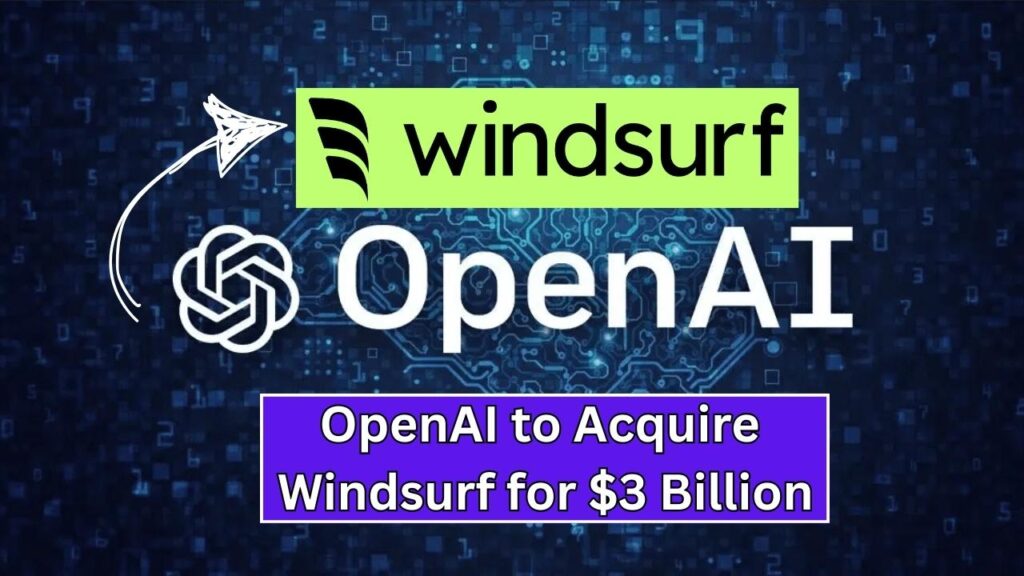OpenAI to Acquire Windsurf for $3 Billion: In a landmark move that’s already sending waves through the tech world, OpenAI is acquiring Windsurf for a staggering $3 billion. This deal, confirmed in early May 2025, marks the largest acquisition in OpenAI’s history and one of the most pivotal mergers in the field of artificial intelligence to date. Whether you’re a developer, a tech leader, or someone simply curious about AI’s rapid evolution, this news matters—big time.

But what does this acquisition really mean for the future of AI, especially in the world of AI coding assistants? How does this reshape the competitive landscape? And most importantly, what should developers and businesses expect moving forward?
Let’s dive into the full story with context, data, expert insights, and actionable takeaways.
OpenAI to Acquire Windsurf for $3 Billion
| Feature | Details |
|---|---|
| Acquisition | OpenAI to acquire Windsurf (formerly Codeium) for $3 billion |
| Purpose | Enhance OpenAI’s AI-powered developer tools and coding assistant platform |
| What’s Windsurf? | AI-native coding tool offering low latency, context-aware suggestions, real-time collaboration, and enterprise support |
| Why It Matters | OpenAI gains control of a leading code generation platform, improving ChatGPT’s capabilities |
| Key Competitors | GitHub Copilot (Microsoft), Claude (Anthropic), Cursor (Anysphere) |
| Official Website | www.windsurf.com |
OpenAI’s $3 billion acquisition of Windsurf is a game-changer for AI-assisted coding. It accelerates OpenAI’s ambitions to own the developer experience, not just the model behind it. Developers can expect smarter, faster, and more integrated coding workflows, while businesses gain tools that offer performance without compromising privacy or control.
This move also signals a new chapter in AI—one where the battle isn’t just about models, but about who owns the tools we use every day.
What Is Windsurf, and Why Did OpenAI Buy It?
Windsurf, previously known as Codeium, is not just another code autocompletion tool. It’s a sophisticated AI-native coding assistant used by software developers, product engineers, and enterprise teams to accelerate development workflows.
Here’s what makes Windsurf stand out:
- Inference-time context compression: It remembers just the right amount of your codebase to give relevant suggestions without lag.
- Real-time performance: Designed for speed, it ensures that AI doesn’t slow you down.
- Enterprise-grade deployment: With privacy-first models and fine-tuning capabilities, it’s trusted by large regulated firms.
- Dev-friendly interface: Supports over 70 languages and integrates with VS Code, JetBrains, and more.
OpenAI acquiring Windsurf gives it a direct pipeline into the IDEs of millions of developers. Rather than only offering code support via ChatGPT, OpenAI now gains a platform that’s built for devs from the ground up.
How This Deal Changes the AI Landscape
This isn’t just a big-money tech merger—it’s a strategic shift.
From Models to Ecosystem Control
Previously, OpenAI focused on building large foundational models like GPT-4 and GPT-5. But this move shows they’re going further: owning the applications developers actually use daily.
“It’s not just about having the best model. It’s about being where the developer lives.” — Alex Atallah, co-founder of OpenSea
By integrating Windsurf into its AI ecosystem, OpenAI ensures ChatGPT, Codex, and its dev tools aren’t just powerful—they’re practical.
Competing with Microsoft and Anthropic
This acquisition puts OpenAI in closer competition with:
- GitHub Copilot (Microsoft’s flagship dev assistant, trained on OpenAI models)
- Claude by Anthropic, which is gaining traction with enterprise teams
- Cursor by Anysphere, a rising star among AI-native IDEs
With Windsurf, OpenAI now has the infrastructure to compete head-on in the developer tools space, offering lower-latency, higher-context, and customizable AI coding environments.
What Developers and Businesses Should Expect
If you’re a developer, this acquisition brings several benefits:
1. Tighter Integration with ChatGPT
Expect to see Windsurf features embedded within ChatGPT Pro, making coding, debugging, and refactoring easier than ever inside one interface.
2. Smarter Code Suggestions
Windsurf’s ability to use compressed context windows means more accurate, less generic suggestions—even in massive codebases.
3. On-Premise Support for Enterprises
For companies in finance, healthcare, or government, this means access to AI coding tools without compromising data privacy.
4. New Pricing and Access Models
With OpenAI’s investment, Windsurf could become more accessible, bundled with ChatGPT Teams or even offered in open-source editions.
The Business and Economic Angle
According to Bloomberg, the AI code assistant market is expected to reach $25 billion by 2027, growing at 35% CAGR. Windsurf has already served:
- Over 500,000 developers
- Thousands of engineering teams
- Fortune 1000 companies seeking secure AI tooling
This deal gives OpenAI a profitable enterprise client base and a massive testbed for fine-tuning its own LLMs.
Additionally, OpenAI gets Windsurf’s proprietary telemetry and data, helping them refine code generation capabilities and improve safety and compliance measures in real-world environments.
Strategic Implications for the Future
This acquisition suggests several broader trends:
- The future of LLMs is domain-specific: General-purpose chatbots are just one piece. Developers want purpose-built tools.
- AI infrastructure wars are heating up: Like how AWS, Azure, and Google Cloud fought over cloud, the next battle is for AI-native platforms.
- OpenAI is moving beyond APIs: Instead of just letting others build apps on their models, they’re building the apps themselves.
Expect to see similar acquisitions by Anthropic, Google DeepMind, and Meta in the next 12–18 months.
OpenAI Abandons For-Profit Restructure Plan – What This Means for the Future of AI
The Godfather of AI Backs Elon Musk’s Warning About OpenAI – Should You Be Worried?
Chrome Takeover? OpenAI Expresses Interest Amid Google’s Antitrust Woes
FAQs About OpenAI to Acquire Windsurf for $3 Billion
What is Windsurf?
Windsurf is an AI coding assistant designed to help developers write, debug, and review code faster. It’s trusted by enterprise teams and integrates with popular development tools like VS Code and JetBrains.
Why did OpenAI buy Windsurf?
OpenAI acquired Windsurf to improve its developer tools ecosystem and compete directly with GitHub Copilot, Anthropic’s Claude, and other AI code tools.
Will Windsurf still be available as a standalone tool?
Most likely yes—OpenAI has hinted at keeping it as a developer-first product while gradually integrating it into ChatGPT.
Is this part of a broader OpenAI strategy?
Absolutely. This marks a clear shift toward owning vertical applications rather than just offering foundational AI models.
Will this affect GitHub Copilot users?
Yes, it could. GitHub Copilot is based on OpenAI models, but with this acquisition, OpenAI is now competing with its own former partner.








